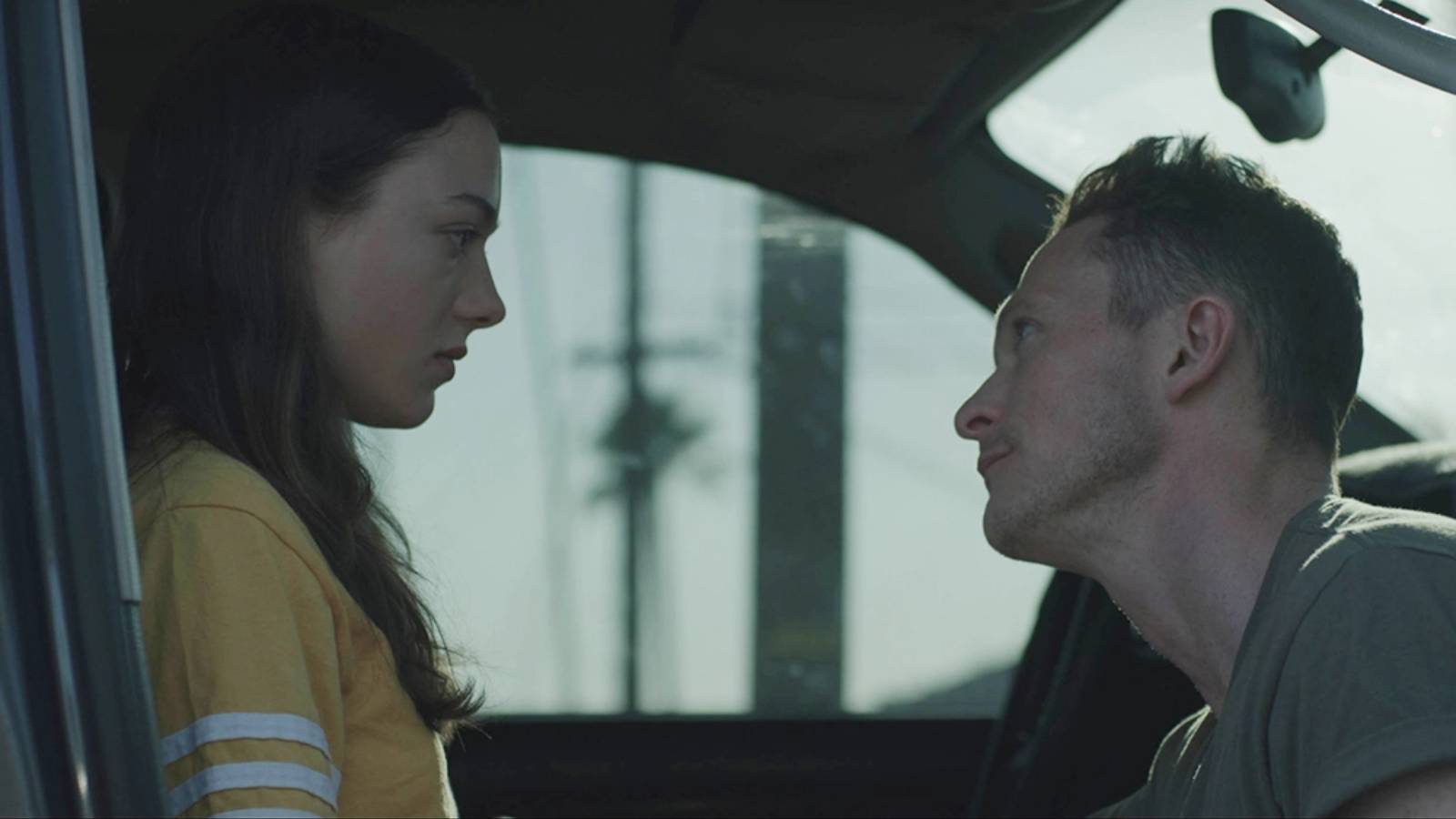While there aren’t many palm trees in sight, the stretch of endless power lines in Lea’s (Lily McInerny) surroundings mirror the nature of her repetitive existence. Her single mom (Gretchen Mol) entertains a string of terrible boyfriends in the pursuit of ever-evaporating companionship. Her immature friends spend their time ranking the hotness of people in their class when they aren’t lifelessly scrolling their Instagram feeds. As a 17-year-old, Lea’s sexual awakenings are either taken as a joke, as her friend fingers a cream-filled donut poking fun at urges, or rather un-involving. In one scene, she starts to gaze out the window while having unsatisfying sex in the backseat of a car with a fellow classmate. It’s a summer defined by boredom, waiting out the days until she can escape the life she was born into.
When a man twice her age, Tom (Jonathan Tucker), takes notice of her at a local diner, he provides the glimmer of attention she’s been lacking in her life. As he pursues a relationship, Jamie Dack’s directorial debut Palm Trees and Power Lines takes a bracingly uncomfortable look at the psychological mind games of grooming before evolving into even darker territory. While the narrative structure can fall into short-turned-debut-feature traps––stretching its central conceit to a breaking point––it works as a blunt cautionary tale and a strong showcase for McInerny in her first feature role.
From the first wink and creepy smile he makes at Lea, Tom’s red flags are there, clearly aware she’s a high-schooler hanging out with her friends. When Lea is pressured by her group to dine and dash and subsequently gets caught, Tom steps in to defend her, establishing the veneer of being a good guy and forging a power dynamic in which she may feel like she owes him one. She reluctantly accepts a ride back home after Tom won’t let up, and so begins a relationship Lea will come to immensely regret. Dack and co-writer Audrey Findlay’s script plays out with a detached hollowness––a fitting approach for the upsetting material, examining the nuances of exploitative abuse as Tom strings Lea along, making her believe she’s in control. McInerny, displaying an emotional naivety in each step, and Tucker, unnerving in his commitment to playing a despicable character that knows every tool of mental entrapment, are both compelling, but one can feel the wheels start to turn before its disturbing third act. As obvious warning signs pile up, most glaringly as Tom takes her to his “home” at a local motel, the film searches for sympathy on Lea’s part. While pursuing the relationship further is the only invigorating thing in her life, the plot machinations start to register as forced by the writers’ hands rather than authentically coming from the character they’ve formed.
Much of the film’s power lies in Dack’s rigid static framing, having her actors play out the unbearable discomfort in long takes and forcing the audience to pick up on the most subtle of reactions, Lea’s facial expressions saying more about lack of consent than her words can muster. By not sensationalizing any moment through rapid cutting of frequent close-ups, cinematographer Chananun Chotrungroj’s often-wide vantage points trap Lea in the frame. In such scenes, Dack explores the varied definitions of consent as Tom commands Lea to perform sexual acts while he’s clearly not attuned to what she desires. Even though Lea may not be speaking up, there’s a lack of emotional consent that Dack captures well.
As Tom gets more possessive and his exploitative objectives become fully realized, Lea gets in far over her head and the overt nature of this cautionary tale is delivered in bracing, unflinching fashion. After this brutal climax, there’s a sense Dack doesn’t know quite how to end the story. By doing so on an even more punishing note than what came before, the cyclical nature of loneliness feeding further abuse continues. While Palm Trees and Power Lines functions as a harrowing lesson for the worst-case scenarios of grooming, there’s an emptiness to the experience that, while reflecting our protagonist’s journey, results in a film that doesn’t feel fully formed.
Palm Trees and Power Lines opens in theaters and on VOD on March 3.

